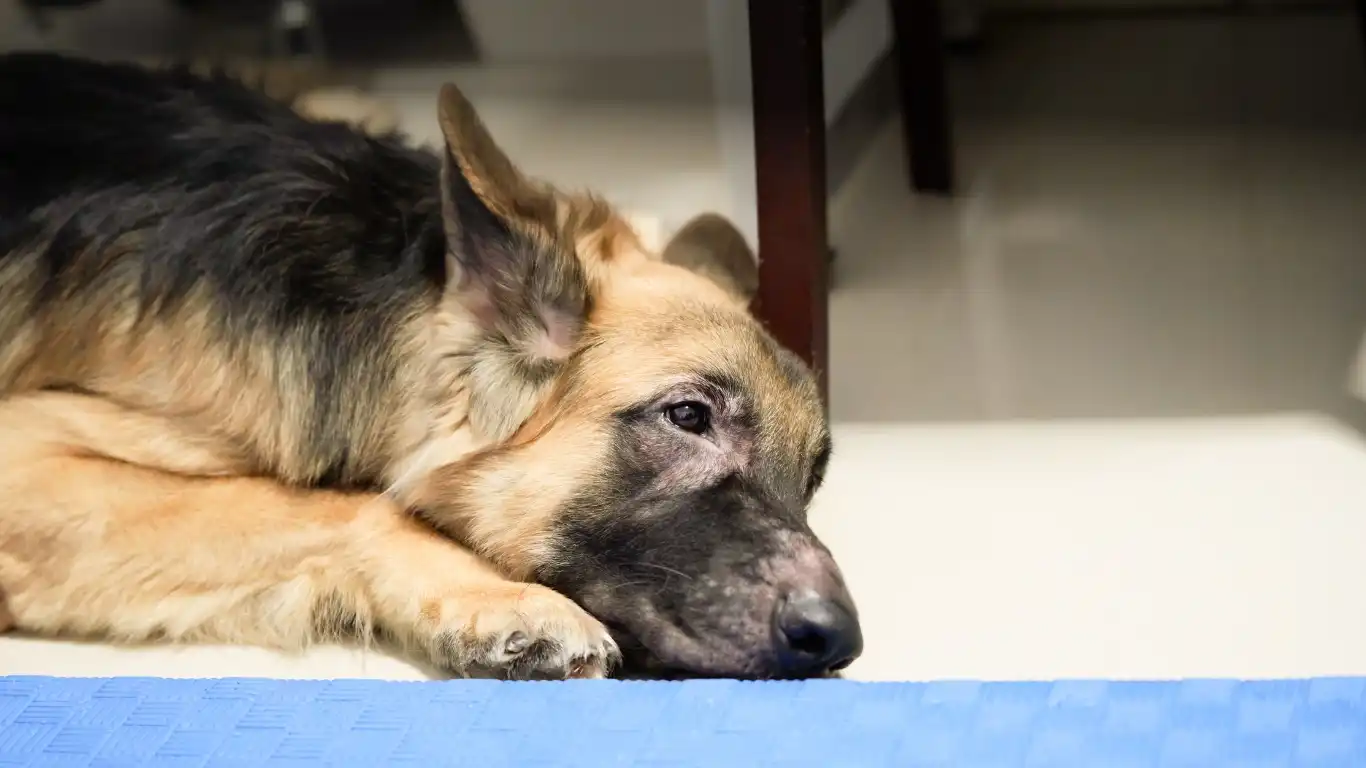How to Help a Dog with Allergies Stop Scratching Fast and Effectively
As a veterinary technician specializing in nutrition, I’ve had the chance to work with many dogs suffering from allergies. One of the most common issues I’ve seen, and the one that can drive both pets and their owners crazy, is a dog constantly scratching. If your dog is incessantly itching and scratching, you might be wondering, “How can I help a dog with allergies stop scratching?” This is something I’ve personally dealt with and learned a lot about through my work. In this article, we’ll dive into practical tips and advice to soothe your furry friend’s itchy skin and help them feel more comfortable. Let’s break it down step by step.
Understanding Allergies in Dogs
Before we dive into the solutions, let’s take a moment to understand what’s going on with your dog’s body when they start scratching. Allergies are an immune system response to something that the body perceives as harmful, even though it may not be. In dogs, the most common triggers are environmental allergens, food sensitivities, or flea bites. Each of these can lead to intense itching, redness, and discomfort, which in turn causes your dog to scratch, bite, and lick at their skin.

Common Causes of Scratching in Dogs
So, what are the common causes of scratching in dogs? Here’s a breakdown of the major culprits:
- Flea allergies: Fleas are one of the most common causes of scratching in dogs. Even if you don’t see fleas, your dog could still be allergic to flea bites.
- Environmental allergens: Pollen, dust mites, mold, and even certain plants can trigger allergic reactions in dogs, leading to itchy skin.
- Food allergies: Certain ingredients in your dog’s diet could be causing an allergic reaction, leading to skin irritation and itching.
- Contact allergies: Sometimes, dogs develop allergies to materials or substances they come in direct contact with, such as fabrics or cleaning products.
How to Help a Dog with Allergies Stop Scratching: Practical Tips
Now that you have a better understanding of what’s causing your dog’s itching, let’s explore some practical steps you can take to help relieve their discomfort. While it’s always best to consult with your vet, these suggestions can help reduce the itching in the meantime.

1. Consult Your Veterinarian
The first step in helping your dog stop scratching is always to consult your veterinarian. A professional can help identify the root cause of your dog’s allergies, whether it’s food-related, environmental, or something else entirely. In many cases, your vet may recommend allergy testing or suggest changing your dog’s diet or medication to help address the issue. With my experience, I’ve seen how much of a difference a proper diagnosis can make, whether it’s adjusting their nutrition or adding supplements to manage allergic reactions.
2. Switch to a Hypoallergenic Diet
Food allergies are one of the most common reasons dogs start itching. If you suspect your dog’s allergies might be diet-related, switching to a hypoallergenic dog food could be a game-changer. These formulas are designed to eliminate common allergens and provide a more easily digestible option for dogs with sensitive stomachs or allergies. Look for foods that have novel protein sources (like duck or venison) and limited ingredients.
In my experience, many dogs show improvement when switched to a high-quality, hypoallergenic diet. Sometimes, it’s the food they’ve been eating all along that’s causing the issue without you even realizing it!
3. Regular Bathing with Allergy-Specific Shampoos
Bathing your dog with the right shampoo can make a world of difference. Look for allergy-friendly or soothing oatmeal shampoos that help cleanse the skin and provide relief from itching. Bathing your dog too often can dry out their skin, so make sure you’re not overdoing it—typically, every 2-4 weeks is a good starting point, depending on your dog’s skin condition.
If your dog’s allergies are more severe, your vet may also recommend medicated shampoos or topical treatments that can help soothe the skin further. Personally, I’ve seen shampoos that include ingredients like aloe vera, vitamin E, and coconut oil provide significant relief, especially when used regularly.
4. Environmental Control: Minimizing Allergens in the Home
If you think environmental allergens like dust, pollen, or mold might be the cause, it’s time to do a little cleaning! Here are some tips to help minimize allergens in your home:
- Frequent vacuuming: Regularly vacuum your home, especially if you have carpets or rugs that trap dust and pollen.
- Wash your dog’s bedding: Wash their bed and blankets frequently to remove any accumulated allergens.
- Use an air purifier: Air purifiers with HEPA filters can help remove airborne allergens and dust particles from your home.
Supplements and Natural Remedies for Itchy Skin
While medications prescribed by your vet are often necessary to treat allergies in dogs, there are also some natural supplements and remedies that can help support your dog’s skin health and reduce itching. Omega-3 fatty acids, which are commonly found in fish oil supplements, are one of the best-known natural solutions for soothing itchy, inflamed skin. These fatty acids work by reducing inflammation and promoting healthier skin. You can find omega-3 supplements specifically designed for dogs, or you can add a small amount of fish oil to their food.

Other supplements like probiotics or antioxidants may also help with your dog’s immune system, reducing allergic reactions. Always talk to your vet before introducing any new supplement to ensure it’s safe for your dog and their particular health needs.
5. Use Antihistamines or Steroid Medications (When Prescribed)
If your dog’s itching is severe, your vet may prescribe antihistamines or even steroids to help manage the allergic reactions. These medications can provide quick relief, but they should always be used under veterinary guidance to avoid side effects. In my practice, I’ve found that antihistamines can be effective for managing mild to moderate allergic reactions, especially when used in combination with other treatments like diet changes and topical treatments.
6. Flea Control: Preventing Flea-Related Allergies
For dogs who are allergic to flea bites, controlling fleas is a must. Even a single flea bite can cause intense itching and allergic reactions in some dogs. Make sure your dog is on a regular flea prevention regimen—whether it’s topical treatments, oral medications, or flea collars. Also, check your dog regularly for fleas, especially if they are showing signs of excessive scratching or biting at their skin.
When to Seek Professional Help for Your Dog’s Allergies
While most of the tips we’ve covered so far can help alleviate your dog’s itching, there are times when professional intervention is absolutely necessary. If you’ve tried several methods to help your dog stop scratching and nothing seems to work, or if your dog’s condition worsens, it’s time to head back to the vet. It’s important to recognize when a simple home remedy isn’t enough, especially if the allergies are causing severe discomfort or leading to secondary infections.

Identifying Severe Symptoms
There are certain signs that should prompt you to take your dog to the vet right away. Here are a few red flags to look out for:
- Persistent or worsening scratching: If your dog’s scratching doesn’t seem to get any better despite trying different methods, it’s time to talk to your vet.
- Hair loss or bald patches: Intense scratching or biting can cause hair loss, and in some cases, even bald patches. This could lead to an infection if not addressed promptly.
- Skin infections: If your dog’s skin becomes red, swollen, or develops sores, it’s likely that the scratching has led to a bacterial or fungal infection.
- Extreme discomfort or distress: If your dog is constantly in distress and can’t seem to get any relief, it’s a sign that something more serious might be at play.
Medical Treatments for Allergy Relief in Dogs
In addition to the at-home remedies we’ve discussed, your vet may prescribe specific medications to help manage your dog’s allergies. These medications work in different ways to help control itching and reduce allergic reactions. It’s important to understand the different options available, so you can make an informed decision about what’s best for your dog.

Allergy Shots (Immunotherapy)
If your dog suffers from environmental allergies, allergy shots (also known as immunotherapy) might be an option. This treatment involves giving your dog a series of injections with small amounts of the allergens that are causing their reaction. Over time, these injections help build up your dog’s immunity to the allergens, reducing the allergic response. It’s not an overnight fix, but it can be very effective for dogs with chronic allergy issues.
From my experience, allergy shots work best when a specific allergen is identified, and the shots are administered regularly. It can take a few months for results, but many dogs experience significant improvement over time.
Antihistamines and Steroids
As mentioned in Part 1, antihistamines and steroids are common medications used to help manage allergic reactions in dogs. Antihistamines, such as Benadryl, can help control itching by blocking the histamine response that triggers allergic reactions. Steroids, like prednisone, can be prescribed to help reduce inflammation and control severe itching. These medications are often used for short-term relief during flare-ups or if the itching is unbearable.
That said, long-term use of steroids isn’t recommended because of the potential side effects. It’s important to follow your vet’s guidance on how and when to use these medications. Antihistamines, on the other hand, are generally safer for longer-term use, but again, always consult with your vet first.
Topical Treatments and Medications
If your dog’s scratching is localized to certain areas, topical treatments can be a great way to provide targeted relief. Your vet might recommend medicated shampoos, sprays, or creams that contain ingredients like hydrocortisone, which helps reduce itching and inflammation. Some topical treatments also include antibacterial or antifungal properties to help prevent infections that can result from constant scratching.
I’ve used topical treatments with several patients, and they can work wonders for dogs with localized itching or rashes. These treatments usually provide quick relief and can be used in conjunction with other therapies for more comprehensive results.
Prevention: Keeping Your Dog Scratch-Free
Once you’ve addressed your dog’s immediate itching, it’s important to think about prevention. While you may not be able to completely eliminate your dog’s allergies, there are plenty of steps you can take to minimize flare-ups and keep your dog comfortable. The key is consistency and proactive care.

Maintain a Healthy Diet
As we touched on earlier, diet plays a major role in your dog’s health and can significantly impact their allergy symptoms. By feeding your dog a high-quality, hypoallergenic diet, you’ll help support their immune system and reduce the likelihood of allergic reactions. In addition to that, adding Omega-3 fatty acids, as well as vitamins and minerals, can help keep their skin and coat healthy.
In my practice, I often recommend a combination of a balanced diet and supplements to improve skin health. The right nutrition can go a long way in keeping your dog’s immune system strong and ready to fight off allergens.
Regular Flea Prevention
Flea allergies are a major source of scratching in many dogs, so staying on top of flea prevention is crucial. Make sure your dog is on a regular flea prevention program that includes topical treatments, oral medications, or flea collars. Even if you don’t see fleas on your dog, they can still be the source of irritation, so it’s better to be safe than sorry.
Also, keep in mind that flea allergies can worsen over time. Even if your dog has only had a mild reaction in the past, ongoing exposure to fleas can intensify the allergic response. Preventing fleas altogether is one of the best ways to stop scratching before it starts.
Routine Skin Care and Bathing
Regular bathing with a gentle, allergy-friendly shampoo can help keep your dog’s skin clean and free of irritants. It’s also a good idea to brush your dog regularly to remove any loose fur or debris that could trigger allergies. Just be sure not to over-bathe, as too much washing can strip natural oils from their coat and lead to dry, irritated skin.
Routine skin care is an easy way to keep your dog feeling comfortable, and it’s something I recommend for all dogs, especially those with sensitive skin or allergies. Regular grooming and bathing can help reduce the number of allergens your dog is exposed to and keep their skin looking and feeling great.
Holistic Approaches to Relieving Dog Allergies
If you’re looking for natural or holistic ways to help your dog with allergies, there are several options you can consider in addition to traditional veterinary treatments. Many dog owners find that a combination of both conventional and natural remedies works best. These approaches can complement the treatments prescribed by your vet, potentially helping to ease your dog’s discomfort in a gentler, more holistic way.

Herbal Remedies
Herbal remedies have been used for centuries to treat various ailments, including allergies. There are several herbs that may help reduce inflammation, soothe itching, and support the immune system. Some commonly recommended herbs for dogs with allergies include:
- Oatmeal: A natural anti-inflammatory, oatmeal can be used in baths to soothe itchy, irritated skin. It can also be found in many dog shampoos formulated for allergy relief.
- Chamomile: Known for its calming properties, chamomile can help alleviate skin irritation and promote healing when used as a topical treatment.
- Yucca: This herb is thought to help reduce inflammation and support joint health, which can be beneficial for dogs dealing with allergic reactions that lead to discomfort and inflammation.
- Nettle: Nettle is another herb that is often used to treat allergies, as it has natural antihistamine properties that can help combat symptoms like itching and swelling.
Essential Oils
Some dog owners also turn to essential oils to manage allergies. While essential oils should always be used with caution and in consultation with a vet, they can provide relief for certain skin irritations or discomfort caused by allergies. Some oils like lavender and chamomile have anti-inflammatory and soothing properties that can help reduce scratching.
However, not all essential oils are safe for dogs. For example, oils like tea tree oil or eucalyptus oil can be toxic to pets, so always make sure to consult your vet before using essential oils in any form around your dog. Diluting oils and using them in a diffuser or mixed with a carrier oil for topical application are often the safest methods.
Managing Chronic Allergies in Dogs
For dogs with chronic allergies, it’s important to adopt a long-term management plan that includes a mix of strategies to prevent flare-ups. This might involve changes to their diet, lifestyle, or environmental factors, along with regular veterinary checkups to monitor their condition. Chronic allergies can be frustrating, but with the right approach, you can help your dog lead a happy, comfortable life.
Long-Term Dietary Adjustments
As we mentioned earlier, food allergies can be a significant cause of itching in dogs. If your dog is suffering from chronic allergies, long-term changes to their diet might be necessary. Consider transitioning to a more specialized diet, like a prescription hypoallergenic food or a limited-ingredient diet, which eliminates common allergens like beef, chicken, or grains.
Additionally, consider adding high-quality fatty acids, such as Omega-3 and Omega-6, which can improve skin health and reduce inflammation. If you’re unsure which diet is best for your dog, your vet can help you find the right food based on their specific allergies.
Environmental Control for Chronic Allergies
For dogs with environmental allergies, managing the environment is key. Regular cleaning, frequent washing of bedding, and using air purifiers can go a long way in minimizing exposure to allergens like dust, pollen, and mold. During allergy season, you may want to consider keeping your dog indoors more often, especially when pollen counts are high, or you can wash your dog’s paws after walks to remove any allergens they may have picked up outside.
As I’ve seen in practice, chronic allergies can often be managed effectively with a consistent approach to environmental control. Being proactive about keeping allergens to a minimum can make a huge difference in your dog’s quality of life.
When Your Dog Needs Allergy Testing
If your dog’s symptoms are persistent and you’re not sure what the exact cause of their allergies is, allergy testing can be incredibly helpful. By identifying the specific allergens that are triggering your dog’s reactions, you and your vet can create a more targeted treatment plan. There are two main types of allergy tests available:
- Skin tests: These tests involve applying small amounts of allergens to the dog’s skin and observing any reactions. This is usually done by a veterinary dermatologist.
- Blood tests: Blood tests can also be used to check for the presence of antibodies that react to specific allergens.
What to Expect from Allergy Testing
While allergy testing can provide valuable insights, it’s not always necessary for every dog. If your dog’s allergy symptoms are manageable with diet changes and topical treatments, you may not need testing. However, for dogs with severe or chronic allergies, allergy testing can help identify triggers and lead to more effective treatment plans.
In my experience, allergy testing has been a game-changer for many dogs. It allows for a much more precise approach to treatment and helps owners make informed decisions about managing their dog’s allergies.
References
For more information on dog allergies and treatments, here are some trusted sources you can consult:
Disclaimer
While this article provides general information about managing dog allergies, it’s important to remember that each dog is unique. Always consult with your veterinarian before making any changes to your dog’s diet, medication, or treatment plan. Your vet is the best resource for providing personalized advice tailored to your dog’s specific health needs. This article is intended to inform and assist in understanding general approaches to managing allergies, but it should not be used as a substitute for professional veterinary care.





